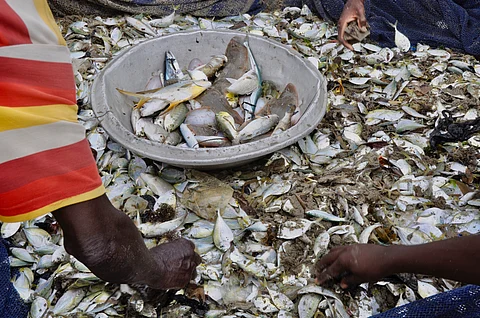

A new study published in journal Science paints a dire picture for the world’s fish populations. Researchers found that significantly more fish stocks are overfished or have already collapsed compared to previous estimates.
The culprit? Fishing pressure that exceeds what fish populations can naturally replenish. This pressure comes from both local fishers and massive industrial fleets capable of catching enormous quantities of fish. Policymakers intended catch limits based on scientific advice to prevent overfishing. However, the new study suggested these limits were often set too high.
In theory, catch limits should ensure sustainability by not exceeding fish populations' productive capacity while also allowing depleted stocks to rebuild.
The research led by Australian cientists analysed data from 230 fish stocks encompassing 128 species. They found that previous assessments overestimated fish abundance and their ability to rebound after depletion. This resulted in “phantom recoveries,” where stocks appeared healthy when they were actually continuing to decline.
The study focused on biomass, the total weight of fish in a stock. When catches fall below 10 per cent of the original biomass, the stock is considered collapsed.
The study reveals a shocking truth: Nearly a third of fish stocks classified by the Food and Agriculture Organization (FAO) as “maximally sustainably fished” are actually overfished. Even more alarming is the likely underestimation of collapsed stocks. The research suggests that within the overfished category, 85 per cent more stocks have likely collapsed (below 10 per cent original biomass) than previously estimated.
Accompanying the study was a perspective paper by renowned fisheries scientists Rainer Froese from the GEOMAR Helmholtz Centre for Ocean Research Kiel and Daniel Pauly from the University of British Columbia.
The fisheries scientists, in their paper published in Science to coincide with the new study, explained that distortion in stock assessment occurs when the methods used require multiple parameters and variables, making them overly complex.
When uncertain situations arise, Froese and Pauly advocate for more conservative stock assessments and management.
The study advocated for the widespread adoption of ecosystem-based sustainable fishing. This approach proposes allowing fish to reproduce before being caught, using environmentally friendly fishing gear and establishing protected zones. The principles of ecosystem-based sustainable fishing require reducing catches of forage fish such as anchovies, sardines, krill and herring in order to keep important food chains functioning.